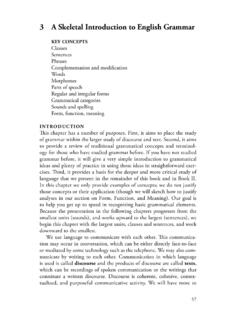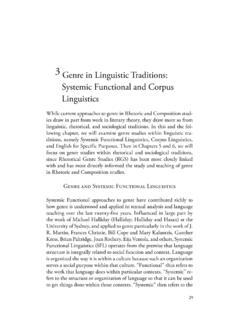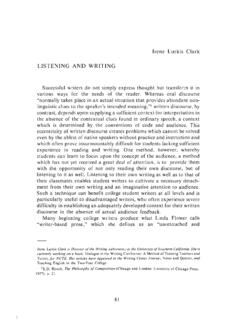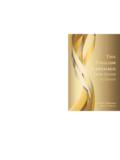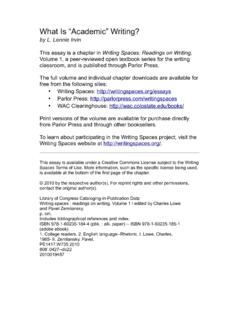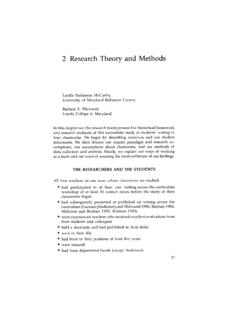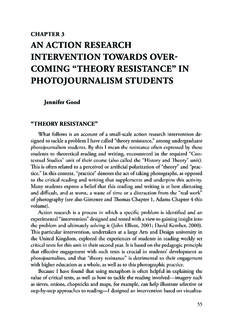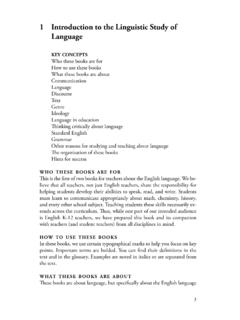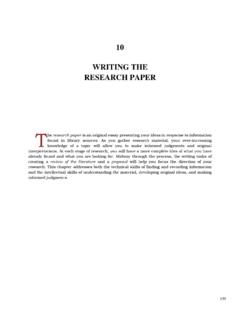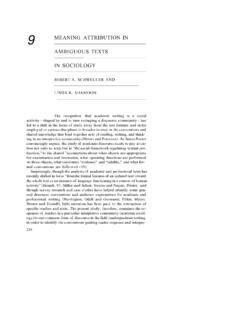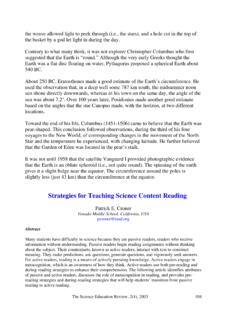Transcription of Reading Games: Strategies for Reading Scholarly Sources
1 Reading Games: Strategies for Reading Scholarly Sources by Karen Rosenberg This essay is a chapter in Writing Spaces: Readings on Writing, Volume 2, a peer-reviewed open textbook series for the writing classroom. Download the full volume and individual chapters from: Writing Spaces: Parlor Press: WAC Clearinghouse: Print versions of the volume are available for purchase directly from Parlor Press and through other booksellers. This essay is available under a Creative Commons License subject to the Writing Spaces'. Terms of Use. More information, such as the specific license being used, is available at the bottom of the first page of the chapter.
2 2011 by the respective author(s). For reprint rights and other permissions, contact the original author(s). Library of Congress Cataloging-in-Publication Data Writing spaces : readings on writing. Volume 1 / edited by Charles Lowe and Pavel Zemliansky. p. cm. Includes bibliographical references and index. ISBN 978-1-60235-184-4 (pbk. : alk. paper) -- ISBN 978-1-60235-185-1 (adobe ebook). 1. College readers. 2. English language--Rhetoric. I. Lowe, Charles, 1965- II. Zemliansky, Pavel. 2010. 808'.0427--dc22. 2010019487. Reading Games: Strategies for Reading Scholarly Sources Karen Rosenberg If at First You Fall Asleep .. During my first year in college, I feared many things: calculus, cafete- ria food, the stained, sweet smelling mattress in the basement of my dorm.
3 * But I did not fear Reading . I didn't really think about Reading at all, that automatic making of meaning from symbols in books, news- papers, on cereal boxes. And, indeed, some of my coziest memories of that bewildering first year involved Reading . I adopted an overstuffed red chair in the library that enveloped me like the lap of a depart- ment store Santa. I curled up many evenings during that first, bril- liant autumn with my English homework: Toni Morrison's The Bluest Eye, Gloria Naylor's Mama Day, Sandra Cisneros' The House on Mango Street. I'd read a gorgeous passage, snuggle deeper into my chair, and glance out to the sunset and fall leaves outside of the library window.
4 This felt deeply, unmistakably collegiate. But English was a requirement I planned to major in political sci- ence. I took an intro course my first semester and brought my readings to that same chair. I curled up, opened a book on the Chinese Revolu- tion, started Reading , and fell asleep. I woke up a little drooly, surprised at the harsh fluorescent light, the sudden pitch outside. Not to be de- * This work is licensed under the Creative Commons Attribution- Noncommercial-ShareAlike United States License and is subject to the Writing Spaces' Terms of Use. To view a copy of this license, visit http://. or send a letter to Creative Commons, 171 Second Street, Suite 300, San Francisco, California, 94105, USA.
5 To view the Writing Spaces' Terms of Use, visit http://writingspaces. org/terms-of-use. 210. Strategies for Reading Scholarly Sources 211. terred, I bit my lip and started over. I'd hold on for a paragraph or two, and then suddenly I'd be thinking about my classmate Joel's elbows, the casual way he'd put them on the desk when our professor lectured, sometimes resting his chin in his hands. He was a long limbed runner and smelled scrubbed a mixture of laundry detergent and shampoo. He had black hair and startling blue eyes. Did I find him sexy? Crap! How many paragraphs had my eyes grazed over while I was thinking about Joel's stupid elbows?
6 By the end of that first semester, I. abandoned ideas of majoring in political science. I vacillated between intense irritation with my assigned readings and a sneaking suspicion that perhaps the problem was me I was too dumb to read academic texts. Whichever it was a problem with the readings or with me I. carefully chose my classes so that I could read novels, poetry, and plays for credit. But even in my English classes, I discovered, I had to read dense Scholarly articles. By my Junior year, I trained myself to spend days from dawn until dusk hunkered over a carrel in the library's base- ment armed with a dictionary and a rainbow of highlighters.
7 Enjoying my Reading seemed hopelessly na ve an indulgence best reserved for beach blankets and bathtubs. A combination of obstinacy, butt-numb- ingly hard chairs, and caffeine helped me survive my Scholarly Reading assignments. But it wasn't fun. Seven years later I entered graduate school. I was also working and living on my own, cooking for myself instead of eating off cafeteria trays. In short, I had a life. My days were not the blank canvas they had been when I was an undergraduate and could sequester myself in the dungeon of the library basement. And so, I finally learned how to read smarter, not harder. Perhaps the strangest part of my Reading transformation was that I came to like Reading those dense Scholarly articles; I came to crave the process of sucking the marrow from the texts.
8 If you can relate to this, if you also love wrestling with academic journal articles, take joy in arguing with authors in the margins of the page, I am not writing for you. However, if your Reading assignments confound you, if they send you into slumber, or you avoid them, or they seem to take you way too long, then pay attention. Based on my experience as a frustrated stu- dent and now as a teacher of Reading Strategies , I have some insights to share with you designed to make the Reading process more productive, more interesting, and more enjoyable. 212 Karen Rosenberg Joining the Conversation1. Even though it may seem like a solitary, isolated activity, when you read a Scholarly work, you are participating in a conversation.
9 Academic writers do not make up their arguments off the top of their heads (or solely from creative inspiration). Rather, they look at how others have approached similar issues and problems. Your job and one for which you'll get plenty of help from your professors and your peers is to locate the writer and yourself in this larger conversation. Reading academic texts is a deeply social activity; talking with your professors and peers about texts can not only help you understand your readings better, but it can push your thinking and clarify your own stances on issues that really matter to you. In your college courses, you may have come across the term rhe- torical Reading .
10 2 Rhetoric in this context refers to how texts work to persuade readers a bit different from the common connotation of empty, misleading, or puffed up speech. Rhetorical Reading refers to a set of practices designed to help us understand how texts work and to engage more deeply and fully in a conversation that extends beyond the boundaries of any particular Reading . Rhetorical Reading practices ask us to think deliberately about the role and relationship between the writer, reader, and text. When thinking about the writer, we are particularly interested in clues about the writer's motivation and agenda. If we know something about what the writer cares about and is trying to accomplish, it can help orient us to the Reading and understand some of the choices the writer makes in his or her work.
